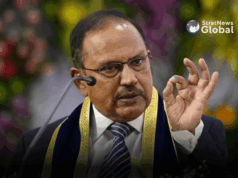
Song and dance play an important role in the tribal culture of South Sudan. In this video in the Presidential Complex in the capital, Juba, Dinka tribe members celebrate the appointment of two Governors.
South Sudan is the world’s newest country, gaining independence from Sudan in 2011 as the outcome of a 2005 agreement that ended Africa’s longest civil war. But that didn’t put an end to the conflict. Civil war that broke out in 2013 after a fallout between President Salva Kiir and then vice-president Dr Riek Machar has displaced more than four million people. A power-sharing deal in 2018 is trying to end that conflict. The deal signed between President Kiir and Dr Machar has broadly stopped a conflict that has killed an estimated 383,000 people and left most of the over 12 million people facing malnutrition and severe food insecurity. The UN estimates more than 2.4 million are internally displaced or refugees in the region.
South Sudan has more than 60 ethno-tribal groups. The Dinkas and Nuer (mainly animistic and pastoralist) tribes are estimated to be more than 50 per cent of the population. They (and other groups) are known for cattle raiding and land grabbing since the 1800s. The rest of the people belong to the Shilluk (pastoralists who mostly live along the Nile and trace their ancestry to an independent kingdom), Murle, Azande, Bari, Kakwa, Mandari and other smaller groups. The Dinkas enjoy the most economic and political power. The first President—Salva Kiir— is of Dinka heritage. In 2016, Dr Riek Machar— a Nuer—was sworn in as Vice-President. Tension between the two men forced the latter from office and into exile. The conflict between the two mirrors the wider one in South Sudan—primarily fought between the Dinka, Nuer and Murle groups. Dr Machar is expected to return as Vice President if the peace deal signed in September 2018 holds. The second deadline for forming a unity government though has been pushed back by 100 days from November 12, 2019 to February 20, 2020,
India has over 2,500 men and women in rotation under the UN peacekeeping umbrella.















